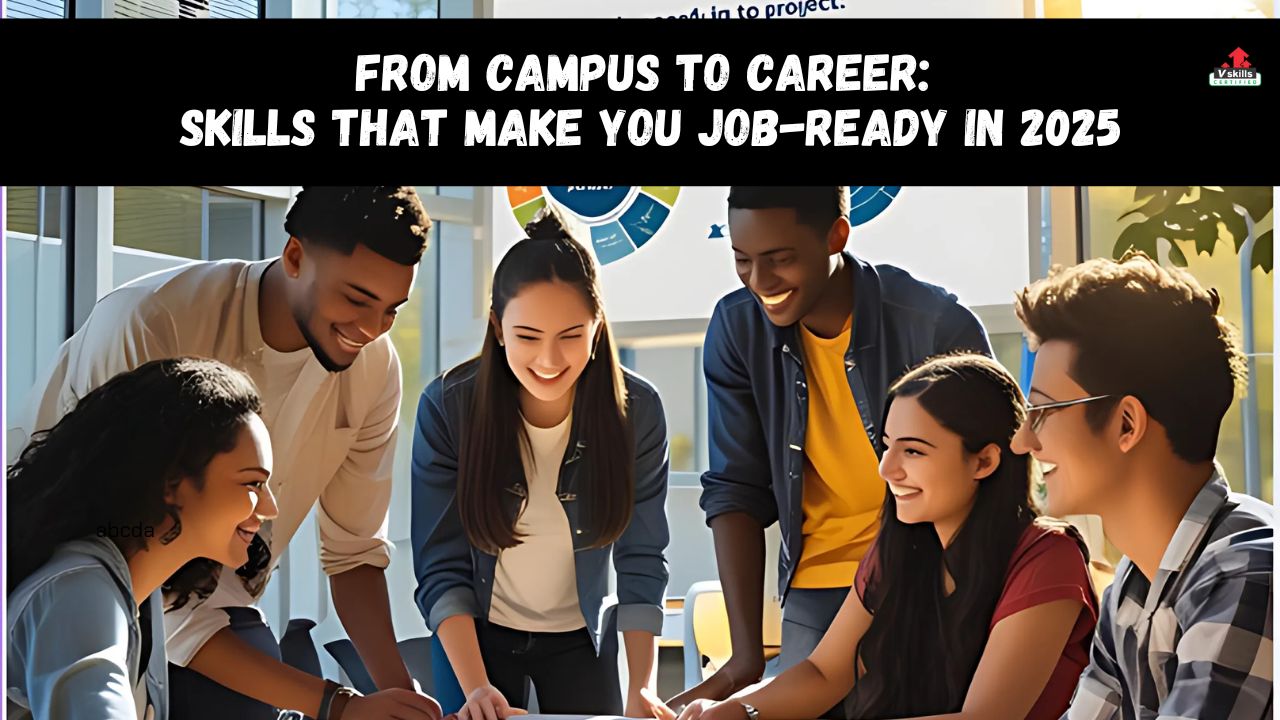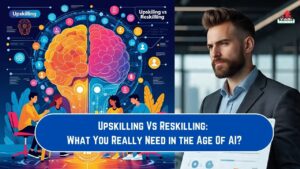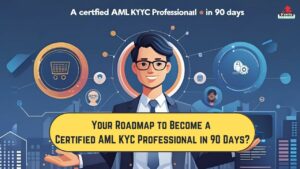Making the transition from college classrooms to corporate corridors is a defining moment for every graduate. But in 2025, being job-ready means far more than just holding a degree. It’s about possessing a dynamic set of skills that align with the demands of a fast-evolving job market. To be truly job-ready in 2025, students must go beyond textbooks and build capabilities that demonstrate real-world value from day one.
In an age shaped by automation, AI, remote collaboration, and global talent competition, employers are searching for candidates who are not just qualified but prepared to contribute immediately. This means the ability to solve problems, adapt quickly, communicate effectively, and navigate digital tools with confidence. Soft skills, tech fluency, creativity, and emotional intelligence are no longer optional—they’re essential.
So, what does it take to be job-ready in 2025?
Whether you are preparing for campus placements, internships, or your first full-time role, this blog will walk you through the core skills and traits employers look for in new hires. From mastering emerging technologies to developing a growth mindset, we’ll help you understand what sets high-potential candidates apart—and how you can position yourself as one. It’s time to take control of your future. Let’s explore what it means to be job-ready in 2025—and how you can start building those skills today.
Introduction: The New Graduate Challenge
Graduating from college is often described as the beginning of the “real world,” and in 2025, that world is evolving faster than ever. The lines between job roles are blurring, industries are transforming at breakneck speed, and employers are no longer content with hiring candidates based solely on academic credentials. Instead, they are actively seeking job-ready graduates who can hit the ground running, adapt quickly, and make meaningful contributions from day one.
But what does it mean to be job-ready in 2025?
It goes far beyond having a well-designed resume or knowing how to answer common interview questions. Today’s hiring managers seek a powerful combination of technical expertise, digital fluency, soft skills such as communication and adaptability, and, above all, a growth mindset. In an era where remote work, AI-driven automation, and global collaboration are redefining how businesses operate, the expectations placed on new entrants to the workforce are both more demanding and more exciting than ever before.
Beyond the technical know-how, companies are placing increasing value on how you think, how you learn, and how you interact with others. Can you analyse data and draw insights? Are you comfortable using collaboration tools like Slack, Zoom, and Notion? Can you take ownership of your work and manage your time in a hybrid or fully remote environment? Most importantly, are you willing to keep learning, constantly?
Employers today are not just looking for employees, they’re looking for problem-solvers, innovators, and self-starters. They’re scanning for those who can evolve alongside the business, not those who need constant direction. The bar has been raised, but so have the opportunities.
If you’re a student wondering how to prepare or a recent graduate trying to understand what employers want, this blog is for you. We’ll break down the essential skills you need to develop, the tools and habits that can give you an edge, and real-world strategies to leap from campus to career successfully. Whether your field is tech, business, design, marketing, or beyond, the tips in this guide are relevant and actionable.
By the end of this guide, you will have a clear roadmap to not just find a job, but to thrive in it, grow within it, and shape a meaningful career path for yourself. The transition from campus to career isn’t just a phase; it’s a transformation. And the best time to prepare is now.
1. Mastering Digital Literacy: Your Baseline Skill Set
Digital literacy is more than knowing how to use a spreadsheet or run a Google search. In 2025, it’s about being comfortable with emerging tools, platforms, and workflows that businesses rely on.
Key Digital Skills:
- Office Tools Proficiency: Excel, Google Workspace, and project management tools like Trello, Asana, and Monday.com.
- Cloud Computing: Basics of AWS, Azure, or Google Cloud. These are especially crucial if you’re entering IT, marketing, or operations.
- AI and Automation: Understanding how AI is being used in your field—whether it’s through ChatGPT in customer support, or automation tools in HR.
- Data Literacy: Knowing how to read, interpret, and act on data. Not just for analysts—every department now uses data.
How to Build It:
- Take short courses on Coursera, Udemy, or Vskills.
- Watch tutorial videos and apply the skills to real or mock projects.
- Add digital badges to your LinkedIn profile.
2. Emotional Intelligence (EQ): The Future-Proof Skill
When roles get automated, the human side of work becomes more valuable. Emotional intelligence (EQ) is the ability to manage your emotions and navigate social complexities, an underrated but critical job skill in 2025.
Components of EQ:
- Self-awareness: Knowing your strengths, weaknesses, and triggers.
- Self-regulation: Staying calm under pressure and adapting to change.
- Empathy: Understanding how others feel and responding appropriately.
- Social skills: Building rapport, leading teams, and resolving conflicts.
Why EQ Matters:
In team settings, how you communicate is as important as what you communicate. Teams that gel well perform better. Managers want to hire people who get along with others, solve problems diplomatically, and uplift the culture.
3. Adaptability and Resilience: Thriving in Unpredictability
If COVID-19 and subsequent economic shifts taught us anything, it’s that change is constant. In 2025, the only certainty is that new tools, expectations, and business models will emerge frequently. Those who adapt quickly will survive and thrive.
Traits to Cultivate:
- Open-mindedness: Embrace new technologies and ideas.
- Learning agility: Pick up skills on the fly and apply them.
- Mental toughness: Handle setbacks without losing motivation.
Practical Tips:
- Try roles outside your comfort zone in internships.
- Use feedback constructively, not defensively.
- Reflect on the challenges that they taught you and how you grew.
4. Communication Skills: The Bridge Between Ideas and Execution
Whether it’s a Zoom call, a client presentation, or a team email, communication defines your brand in the workplace.
Core Communication Skills:
- Verbal: Presenting ideas clearly and persuasively.
- Written: Crafting structured, error-free emails, proposals, and reports.
- Non-verbal: Body language, tone of voice, eye contact.
- Listening: Actively understanding and responding to others.
How to Sharpen Them:
- Join student debate clubs, MUNs, or Toastmasters.
- Use Grammarly or the Hemingway App to improve writing.
- Practice mock interviews and record yourself.
Remember: It’s not just what you say, it’s how you say it that creates impact.
5. Critical Thinking and Problem Solving: Your Secret Weapon
As workplaces become more tech-driven, your ability to think critically and solve complex problems becomes a differentiator.
What It Looks Like:
- Breaking down problems logically
- Identifying root causes rather than treating symptoms
- Proposing multiple solutions and evaluating trade-offs
Where You Use It:
- Making product or process improvements
- Troubleshooting tech or operational issues
- Making decisions in ambiguous scenarios
Build This Skill:
- Solve case studies or participate in hackathons.
- Use decision matrices for practice.
- Ask “why?” five times before proposing a solution.
Employers in 2025 are hungry for thinkers, not just doers.
6. Teamwork and Collaboration: Remote and Real
Gone are the days when working in a team meant sitting around a conference table. Today, you might work with people across time zones using Slack, Zoom, or Microsoft Teams.
Key Collaborative Skills:
- Cross-functional understanding: Know how to work with marketers if you’re a developer, and vice versa.
- Active participation: Show up, contribute, and share ownership.
- Constructive feedback: Be able to give and receive criticism respectfully.
Tools to Know:
- Google Docs for collaborative writing.
- Notion or Confluence for shared project wikis.
- Slack/Discord for team communication.
Whether remote or in-person, teamwork is what gets things done. Master it.
7. Time Management and Prioritization: Doing More with Less
Managing your tasks well means less stress, better work-life balance, and a reputation for reliability.
How to Get Better:
- Use the Eisenhower Matrix: Focus on what’s important, not just what’s urgent.
- Set daily goals: Break large tasks into manageable steps.
- Batch similar tasks: For example, check emails at specific intervals instead of constantly.
Tools That Help:
- Todoist or Microsoft To Do
- Google Calendar with reminders
- Pomodoro Timer for focus sprints
Good time management is not about being busy, it’s about being productive.
8. Networking: Building Bridges Before You Need Them
In 2025, it’s not just what you know or who you know, it’s who knows what you know. Building a network is essential, and it starts while you’re still on campus.
Start Here:
- LinkedIn: Create a profile, add alumni, follow companies, engage with content.
- Professional Groups: Join industry bodies, attend virtual webinars, or local meetups.
- Faculty Relationships: Professors can refer you to job openings or recommend you for research roles.
How Networking Helps:
- Insider info on job openings
- Mentorship and guidance
- Collaborations and referrals
Don’t just connect, contribute. Share knowledge and offer help, and your network will grow organically.
9. Continuous Learning: Stay Sharp, Stay Relevant
The job you start with in 2025 might be obsolete in 2030. That’s not a reason to panic, just a reason to keep learning.
Lifelong Learning Habits:
- Microlearning: Short daily lessons via apps or email.
- Certifications: Vskills, Coursera, Google, HubSpot; these all add weight.
- Books & Podcasts: Industry trends, thought leadership, and success stories.
Growth Mindset:
Coined by Carol Dweck, a growth mindset means believing that your abilities can be developed. Employers love this because it shows you’re trainable and open to feedback.
10. Industry-Specific & Technical Skills: Get the Competitive Edge
Depending on your chosen field, some skills are absolute must-haves. Don’t just know the theory, get hands-on.
Examples:
- Tech & IT: Coding languages (Python, JavaScript), GitHub, Docker
- Finance: Excel modeling, Tableau, QuickBooks, blockchain basics
- Marketing: Google Ads, SEO, analytics tools, content marketing
- Design: Figma, Canva, Adobe Suite, UI/UX principles
- HR & Operations: SAP, ERP systems, HR analytics
Research job descriptions in your field and find the most common tools or platforms listed. Learn those.
90-Day Job-Ready Routine: Week-by-Week Plan
Making the leap from campus to career can feel overwhelming—but with a structured plan, it becomes a journey of intentional growth. The 90-Day Job-Ready Routine is a focused, week-by-week roadmap designed to help students and recent graduates build the essential skills employers demand in 2025. In just three months, you can shift from being academically qualified to genuinely job-ready in 2025, equipped with a blend of technical know-how, professional polish, and industry awareness. Each week is dedicated to a specific focus—like communication skills, resume and LinkedIn optimization, hands-on project work, mock interviews, and personal branding. Whether you’re still on campus or have just graduated, this routine bridges the gap between education and employment—empowering you to confidently step into the job market with skills that matter.
Weeks 1–2: Set the Foundation
- Update your resume (focus on skills and achievements).
- Polish your LinkedIn profile (photo, headline, summary, key skills).
- List your top technical and soft skills; identify skill gaps.
Weeks 3–4: Upskill Smartly
- Choose and complete one short, job-relevant certification course (Vskills, Coursera, etc.).
- Add the certificate to your resume and LinkedIn.
- Reflect on what you’ve learned and how it applies to your target roles.
Weeks 5–6: Show What You Know
- Write a short blog or LinkedIn post about your learning journey or project experience.
- Share insights, takeaways, or tools you’ve mastered.
- Engage with content from others in your field, comment, repost, and connect.
Weeks 7–8: Grow Your Network
- Reach out to alumni or professionals for informational chats.
- Join LinkedIn or virtual networking groups in your industry.
- Attend at least one online event or webinar.
Weeks 9–10: Practice Your Pitch
- Do 2–3 mock interviews (with friends, mentors, or platforms like Pramp).
- Record yourself answering common interview questions.
- Refine your elevator pitch and STAR-based storytelling for interviews.
Weeks 11–12: Apply with Purpose
- Shortlist 10–15 job or internship opportunities.
- Customize your resume and cover letter for each one.
- Keep a simple tracker of where and when you applied.
By Week 12, You’ll Have:
- A strong resume and LinkedIn profile
- At least one job-relevant certification
- A post showcasing your learning or project
- A handful of meaningful connections
- Solid interview prep under your belt
- Multiple job or internship applications sent
Expert Corner: Be the Graduate Companies Want
Transitioning from the academic world to the professional sphere is one of the most transformative phases in your life. It can be exciting, intimidating, and even overwhelming at times, but it’s also full of potential. The choices you make today, the skills you choose to learn, and the habits you develop will shape the trajectory of your career for years to come.
Being job-ready in 2025 isn’t about knowing everything. It’s about being prepared, being teachable, and being adaptable. Employers are no longer looking for perfection, they’re looking for potential. They want to see that you’re proactive, digitally literate, emotionally intelligent, and willing to keep learning even after the diploma is in your hands.
So, take ownership of your growth. Seek feedback. Build your network intentionally. Challenge yourself with projects that stretch your abilities. Start small if you must, but start now. Whether it’s enhancing your Excel skills, polishing your LinkedIn profile, or signing up for an online certification, every step you take today will help you stand taller tomorrow.
You don’t need to wait for a company to hire you to start acting like a professional. Your career doesn’t begin the day you get your first paycheck; it begins the moment you decide to invest in your future.
The workplace of 2025 is fast-paced, connected, and constantly evolving, but so are you. With the right mindset and a solid skillset, you’re not just ready for your first job. You’re ready to build a career that lasts.
Now go claim your place in the workforce prepared, confident, and job-ready.
Start today. Your future self will thank you.



